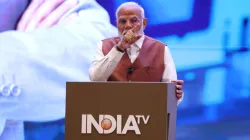'I have to make my 140 crore people happy, not US': PM Modi on India's crude oil import from Russia I WATCH
During the extensive interview on Thursday at Bharat Mandapam, New Delhi, PM Modi emphasised how he has often faced inquiries regarding India's choice to buy crude oil from Russia following President Vladimir Putin's declaration of full-scale war against Ukraine.

Prime Minister Narendra Modi, during an interview with India TV's Chairman and Editor-in-Chief Rajat Sharma on Thursday, revealed how he transformed the country's decade-old foreign policies into a robust one after he took chair for the first time in 2014. During the high-profile interview at Bharat Mandapam in New Delhi on Thursday, he emphasised how he has often faced queries regarding India's choice to procure crude oil from Russia following President Vladimir Putin's declaration of a full-scale war against Ukraine.
"I have frequently been asked questions on how India is purchasing crude oil from Russia by risking New Delhi's relations with the United States. I told them, I am answerable to my 140 crore Indians. If I have to make happy, I will make my 140 crore countrymen happy, not America," PM Modi said. He emphasised that India will buy oil from wherever it suits country's interests. "I maintained this foreign policy, and hence saved my country (from soaring prices and inflation)," he noted.
"I told Putin openly this is not an era of war": PM Modi
At the same time, the Prime Minister underscored how he staunchly told President Putin that "this is not an era of war" during an event in 2022. Notably, PM Modi, during an event in Samarkand, Uzbekistan, repeatedly emphasised that a divided world would find it difficult to fight common challenges. The subtle shift in India's position on the Ukraine and Russia war was widely acclaimed by world leaders.
Notably, India's crude oil import from Russia jumped tremendously after the Russia-Ukraine war, ignoring the threats posed by the US and Europe which imposed tonnes of sanctions on Moscow.
In December 2022, the G7 alliance and its partners declared a limit on the price of Russian oil as part of a set of punitive actions against Moscow due to its invasion of Ukraine. The price restriction limits countries to pay no more than USD 60 per barrel. However, India continued importing oil from Moscow.
"Check my phone calls": PM Modi
During the interview, he also took a dig at those who repeatedly asked about his phone call with Russian President Putin, where he called him to stop the war briefly in order to provide a safe passage to Indian students. "I was always being asked whether I had called Putin to stop the war for Indian students. What will I say to them? Check my phone call details," PM Modi said humorously to the host Rajat Sharma.
Notably, recently, during an interview, External Affairs Minister Dr S Jaishankar also echoed the same and asserted PM Modi called Putin twice and Ukraine President Volodymyr Zelenskyy once for the safe passage of Indian students from Kharkiv and Sumy. "PM Modi called up Putin and told him that our people have worked out a safe zone and (asked him) how can you fire on the safe zone. Putin said he would do the needful. After two-three hours, we got a message that the firing had stopped," Jaishankar said.
'Transformed Congress-manufactured secular foreign policy": PM Modi
He denounced the theories framed to define "secularism" in India while deciding the foreign policies during the Congress-led UPA government. PM Modi recalled his earlier days in the Prime Minister's Office when the bureaucrats and other leaders advised him to visit Israel and Palestine simultaneously in order to keep a balanced approach in the "secular foreign policy". He recalled an instance when he visited Palestine on Jordan's chopper and the Israeli Air Force escorted his entire trip to reach Ramallah.
According to PM Modi, the officials were worried that if he visited Israel abandoning Palestine, it might disseminate a bad impression on both neighbouring turned rival nations. "In my earlier days of Prime Ministership, people advised me to visit Israel and Palestine simultaneously in order to keep a balanced approach in foreign policy," he said while recalling how people made him acquaintance of India's "so-called secular policy" towards Jews and Muslim-dominated Palestine state.